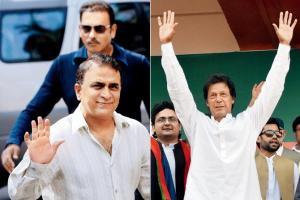Imran Khan had once said that were he and Gavaskar to sit down over a beer, they could sort out the issues between India and Pak

Once Imran Khan is sworn in as Pakistan PM, why not send his friend and peer Sunil Gavaskar to Islamabad as our High Commissioner?
With former Pakistan captain Imran Khan set to be prime minister of his country, why not send his friend and peer Sunil Gavaskar to Islamabad as our High Commissioner? This was former Research and Analysis Wing (RAW) chief AS Dulat's suggestion at a Delhi Gymkhana Club function, where we recently discussed The Spy Chronicles: RAW, ISI and the Illusion of Peace, our book with former Inter-Services Intelligence (ISI) directorate chief General Asad Durrani. Last week's general election in Pakistan came up for discussion, where Imran's Pakistan Tehreek-e-Insaf (PTI) emerged the single largest party in their National Assembly. In his post-win speech Imran said: "Pakistan is ready to improve ties with India. If New Delhi moves one step forward, we will move two."
ADVERTISEMENT
India has officially "welcomed" the election, but there is widespread scepticism about improvement in bilateral relations. Partly this is due to the Pakistan army's role in Imran's rise and former PM Nawaz Sharif's downfall. The judiciary appears to have colluded in fast-tracking corruption cases against Sharif, sentencing him to ten years' imprisonment. Sharif was promptly thrown in prison on his return to Pakistan, but it did not help him electorally. Seven opposition parties denounced the election as "rigged" or "pre-rigged". Terrorist-affiliated candidates contested all seats, aimed at eroding Nawaz Sharif's votes; they could not have done so without the army's blessings (they lost). The European Union and the United States have questioned the election's fairness; the US Department of State said the poll "included constraints placed on freedoms of expression and association during the campaign period that were at odds with Pakistani authorities' state goal of a fully fair and transparent election".
Indian nonchalance also derives from PM Narendra Modi's muscular policy on Pakistan and Kashmir. This policy sees not value in talking till terrorism stops; this policy appears to prove correct Durrani's argument, in our book, that the status quo suits India. We cold-shoulder Pakistan despite two statements in the last eight months by Pakistan army chief General Qamar Ahmed Bajwa supporting any peace talks with India. Home Minister Rajnath Singh tried to nudge the process forward by declaring the government was willing to talk to Kashmiri separatists, who are generally seen as Pakistan's proxies and with whom Modi has repeatedly declared he will have no truck. This initiative was rudely blindsided by his party's sudden withdrawal from the coalition government in J&K.
This hardline approach has satisfied Modi's constituency, but it will not work any longer. America is steadily moving forward on President Donald Trump's aim of withdrawing troops from Afghanistan. There was a three-day ceasefire between the Afghan government and the Taliban last month that was enthusiastically welcomed by all sections in Afghanistan: there were many hugs, and another Eid ceasefire is likely in August-end. State Department officials met with the Taliban last week at the latter's office in Doha. Obviously, the US wants to part ways with all Afghans on friendly terms. Both the Secretary of Defence General James Mattis and the US Commander in Afghanistan General John Nicholson are determinedly pursuing Trump's plan. Imran Khan, in his post-win speech, lent support to the USA's peace efforts in Afghanistan.
It is clear, then, that the US will leave Afghanistan. This is a problem for India, which does not have a clearly-defined policy on Afghanistan other than to follow the US plan. The irony is that we do not talk to the Taliban even though the US openly has, while also militarily confronting it. What India does in a post-US scenario in Afghanistan is something Modi or possibly his successor must urgently confront. Part of the answer to this important strategic question lies in modifying our Pakistan policy and talking to our neighbour. It is inevitable.
During his speech, Imran had said: "I am one of those Pakistanis who want good relations with India." He has on several occasions also stated that he had lots of friends in India, and has often spoken admiringly about Gavaskar. Dulat at the Gymkhana Club recalled Imran once saying that were he and Gavaskar to sit down over a beer, they could sort out the problems between India and Pakistan.
Mainly, however, Imran Khan is different from the other Pakistanis who have been at the helm of affairs, and not just because he was a sportsman or led a wild partying life. He is also looking for a breakthrough for a variety of reasons, including his country's economic health. India ought to seize the moment, instead of waiting two years, as we did after Pervez Musharraf assumed power, only to narrowly miss out on a tantalisingly close peace deal. It is in India's national interest to seize control of the narrative before events in Afghanistan overtake us. Since Modi likes out-of-the-box events to drive policy, what better than to appoint Gavaskar as our man in Islamabad?
Aditya Sinha's latest book, The Spy Chronicles: RAW, ISI and the Illusion of Peace, co-written with AS Dulat and Asad Durrani, is now available. He tweets @autumnshade Send your feedback to mailbag@mid-day.com
Catch up on all the latest Mumbai news, crime news, current affairs, and also a complete guide on Mumbai from food to things to do and events across the city here. Also download the new mid-day Android and iOS apps to get latest updates
 Subscribe today by clicking the link and stay updated with the latest news!" Click here!
Subscribe today by clicking the link and stay updated with the latest news!" Click here!







